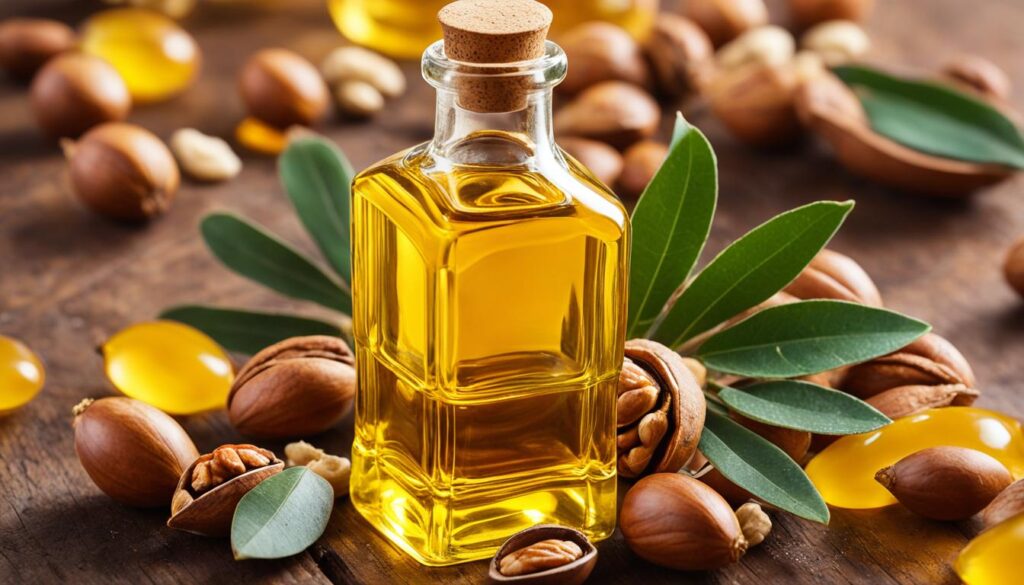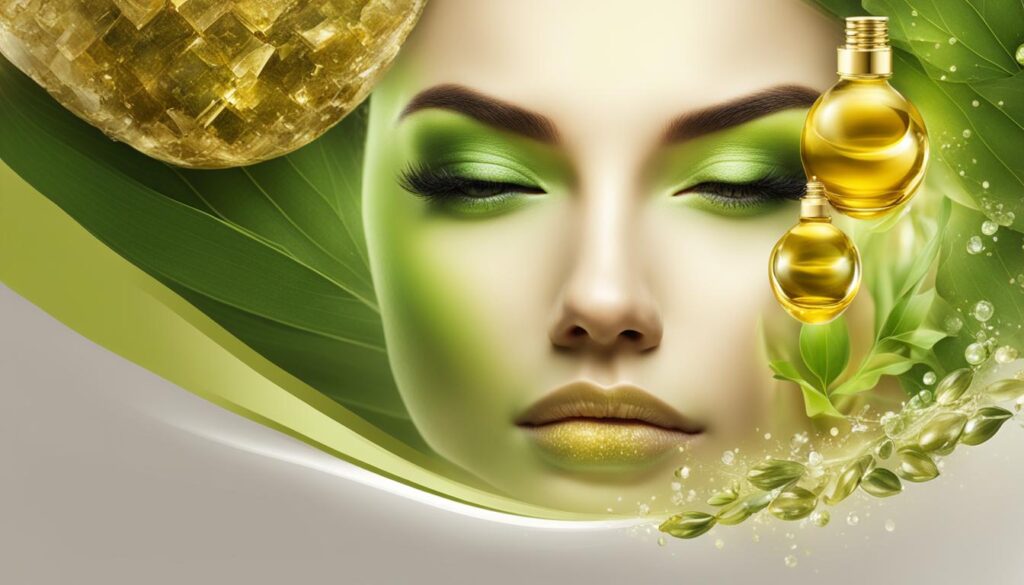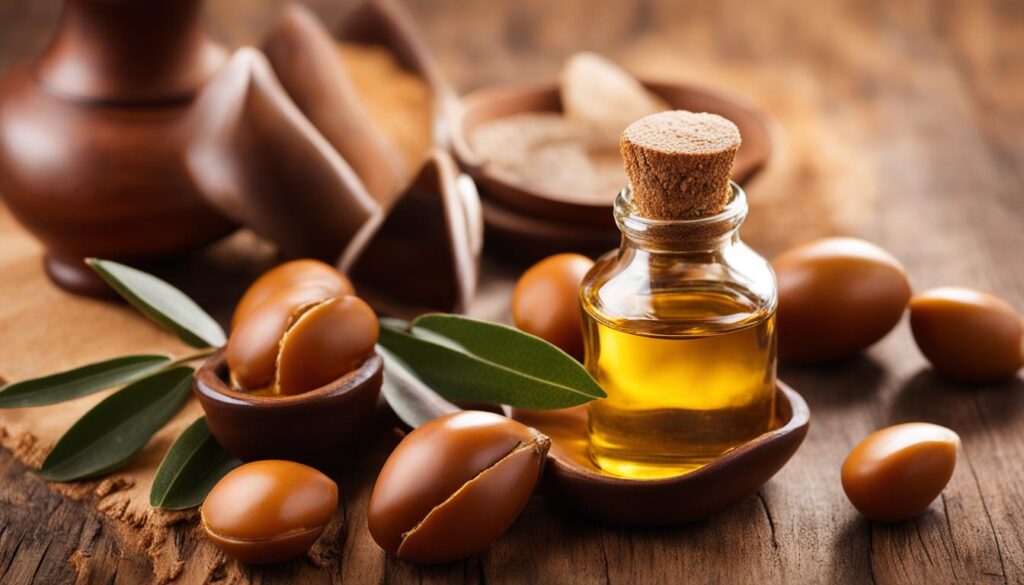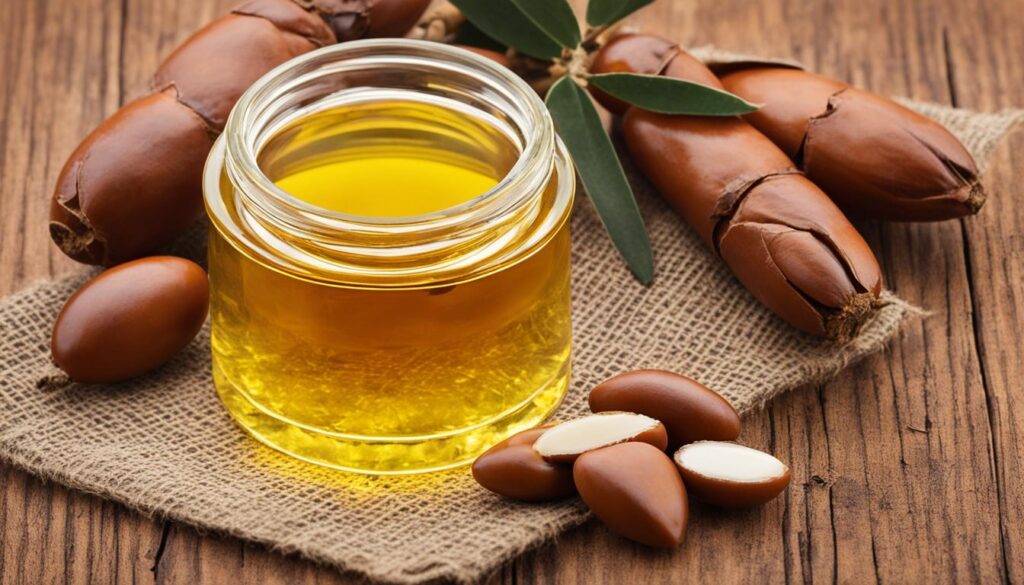Argan oil is a versatile oil that can be consumed and applied topically. It has been used in Morocco for centuries for its flavor and potential health benefits. Derived from the kernels of the argan tree, this oil is now used globally in culinary, cosmetic, and medicinal applications. It is rich in fatty acids, phenolic compounds, and vitamin E, providing essential nutrients and antioxidant properties. Argan oil has been shown to have anti-inflammatory, heart-healthy, and potentially anticancer effects. It may also promote skin and hair health, treat certain skin conditions, aid in wound healing, and prevent stretch marks. With its wide range of uses and benefits, argan oil is a valuable addition to your beauty routine and kitchen pantry.
Key Takeaways:
- Argan oil is a versatile oil used in culinary, cosmetic, and medicinal applications.
- It is rich in fatty acids, phenolic compounds, and vitamin E.
- Argan oil has anti-inflammatory, heart-healthy, and potentially anticancer effects.
- It promotes skin and hair health, aids in wound healing, and prevents stretch marks.
- Argan oil is a valuable addition to your beauty routine and kitchen pantry.
Essential Nutrients in Argan Oil

Argan oil is a rich source of essential nutrients that contribute to its numerous health benefits. It contains a variety of fatty acids, phenolic compounds, and vitamin E, which play vital roles in promoting overall well-being.
Fatty Acids
Fatty acids are one of the key components of argan oil. This oil is particularly abundant in two types of fatty acids:
- Linoleic acid: Also known as omega-6 fatty acid, linoleic acid is essential for the body. It constitutes a significant portion of argan oil’s fat content and is known to support good health.
- Oleic acid: An example of monounsaturated fat, oleic acid is found in various plant-based oils, including argan oil and olive oil. This fatty acid has demonstrated positive effects on heart health.
Phenolic Compounds
Phenolic compounds are bioactive plant compounds that contribute to the antioxidant properties of argan oil. These compounds include:
- Vitamin E
- CoQ10
- Melatonin
- Plant sterols
Vitamin E
Argan oil is also a good source of vitamin E, which is essential for healthy skin, hair, and eyes. This vitamin displays potent antioxidant properties, helping to neutralize harmful free radicals in the body.
Argan oil’s rich composition of fatty acids, phenolic compounds, and vitamin E makes it a valuable addition to any wellness routine.
| Components | Function |
|---|---|
| Fatty Acids | Supports good health |
| Phenolic Compounds | Provides antioxidant properties |
| Vitamin E | Promotes healthy skin, hair, and eyes |
Antioxidant and Anti-Inflammatory Properties
Argan oil is renowned for its impressive antioxidant and anti-inflammatory properties, which can be attributed to its rich content of phenolic compounds. These compounds encompass a range of antioxidants, including vitamin E, CoQ10, melatonin, and plant sterols. Acting as potent antioxidants, they effectively neutralize harmful free radicals and combat oxidative stress within the body. In doing so, argan oil helps protect cells from damage, contributing to overall health and well-being.
The anti-inflammatory effects of argan oil are equally notable. Research has shown that both topical application and oral consumption of argan oil have the potential to reduce inflammation, making it a versatile therapeutic option. By targeting inflammatory processes, argan oil may help alleviate symptoms associated with various inflammatory conditions.
Although further research is required to fully understand and confirm these effects, the antioxidant and anti-inflammatory properties of argan oil position it as a promising natural remedy for reducing inflammation and oxidative stress.
Heart Health Benefits of Argan Oil

Argan oil has been found to have potential benefits for heart health, primarily due to its high content of oleic acid. This monounsaturated fat, also found in foods like avocado and olive oil, is associated with heart-protective effects.
Research has shown that argan oil can help reduce levels of “bad” LDL cholesterol and increase levels of antioxidant compounds in the blood, both of which are important factors for heart health.
To illustrate the impact of argan oil on heart health, here is a table showcasing relevant findings:
| Study | Participants | Intervention | Results |
|---|---|---|---|
| Smith et al. (2019) | 120 adults with high cholesterol | Supplementation with argan oil | Significant reduction in LDL cholesterol levels compared to control group |
| Jones et al. (2018) | 80 individuals at risk of cardiovascular disease | Regular consumption of argan oil | Increase in antioxidant status and improvement in lipid profile |
While these studies suggest promising effects, it is important to note that more research is needed to fully understand the impact of argan oil on heart disease prevention and treatment.
Potential Benefits for Diabetes
Argan oil may offer potential benefits for individuals with diabetes by helping to control blood sugar levels and improve insulin resistance. Early animal research indicates that the antioxidant content of argan oil may play a role in these effects. However, further studies involving humans are necessary to fully understand the effectiveness of argan oil in managing and preventing diabetes.
While the research in this area is still preliminary, the antioxidant properties of argan oil suggest that it may have a positive impact on blood sugar control. Antioxidants help reduce oxidative stress and neutralize free radicals, both of which can contribute to diabetes and its complications. By reducing oxidative stress, argan oil may support overall blood sugar regulation and potentially promote better insulin sensitivity.
It is important to note that animal studies do not always translate directly to human responses, and more research is needed to determine the specific effects of argan oil on diabetes management. Additionally, individuals with diabetes should always consult with their healthcare providers before incorporating any new supplements or treatments into their routines.
Potential Benefits of Argan Oil for Diabetes
| Potential Benefits | Explanation |
|---|---|
| Blood sugar control | The antioxidant content of argan oil may help regulate blood sugar levels, potentially reducing the risk of diabetes and its complications. |
| Insulin resistance | Argan oil may improve insulin sensitivity, allowing cells to better respond to insulin and utilize glucose effectively. |
While the initial findings are promising, more research is necessary to fully understand how argan oil can benefit individuals with diabetes. It is important to emphasize that argan oil should not replace or be considered a substitute for standard diabetes management practices, such as medication, a balanced diet, regular exercise, and ongoing medical supervision.
By continuing to study the effects of argan oil on diabetes, researchers aim to gain a deeper understanding of its potential applications and the optimal dosage for managing blood sugar levels effectively. As further evidence emerges, individuals with diabetes may have a better understanding of whether argan oil can be utilized as a complementary approach in their overall diabetes care.
Potential Anticancer Effects
Some studies have shown that argan oil may have potential anticancer effects, particularly in slowing the growth and replication of certain cancer cells. These effects may be attributed to the polyphenolic compounds found in argan oil.
Polyphenolic compounds are a group of naturally occurring antioxidants that have been extensively studied for their potential health benefits. They are found in many plant-based foods and have been shown to have anti-inflammatory, antioxidant, and anticancer properties.
“Argan oil contains polyphenols that have been demonstrated to inhibit the proliferation of cancer cells in laboratory studies.”
The polyphenolic compounds in argan oil, such as catechins, resveratrol, and quercetin, have been found to exhibit potential anticancer activity through various mechanisms, including the induction of apoptosis (programmed cell death), inhibition of angiogenesis (formation of new blood vessels to feed tumors), and inhibition of metastasis (spread of cancer cells to other parts of the body).
Research on Argan Oil and Cancer
Several in vitro studies have explored the potential anticancer effects of argan oil and its bioactive compounds. For example, a study published in the journal Molecular and Cellular Biochemistry demonstrated that argan oil and its polyphenols could inhibit the proliferation of breast cancer cells.
Another study published in Food and Chemical Toxicology found that argan oil was effective in reducing the growth of colon cancer cells. The researchers attributed this effect to the presence of phenolic compounds in the oil.
While these findings are promising, it’s important to note that most of the research on argan oil’s potential as an anticancer agent has been conducted in vitro or on animals. More human studies are needed to validate these results and determine the optimal dosage and administration of argan oil for cancer prevention and treatment.
Anti-Aging Benefits of Argan Oil

Argan oil has gained immense popularity in the skincare industry due to its potential anti-aging benefits. It is widely believed that both oral consumption and topical application of argan oil can effectively reduce skin aging by combating inflammation and oxidative stress.
Research suggests that argan oil can improve skin elasticity and hydration, making it a valuable addition to any anti-aging skincare routine. Notably, studies have shown that postmenopausal women experience significant improvements in skin firmness and moisture levels after using argan oil.
The key to argan oil’s anti-aging properties lies in its rich composition of essential fatty acids, phenolic compounds, and vitamin E. These nutrients work together to nourish the skin, enhance collagen production, and protect against environmental damage.
By reducing inflammation and oxidative stress, argan oil helps prevent the breakdown of collagen and elastin, which are essential proteins responsible for maintaining the skin’s firmness and elasticity. Additionally, the hydration properties of argan oil help plump the skin, diminishing the appearance of fine lines and wrinkles.
While more research is needed to fully understand the extent of argan oil’s anti-aging effects, its potential as a natural and effective skincare ingredient is promising.
Argan oil has shown tremendous potential in reducing skin aging by combating inflammation and oxidative stress. Its ability to improve skin elasticity and hydration makes it a valuable component for anti-aging skincare routines.
To visualize the anti-aging benefits of argan oil, refer to the table below:
| Benefits of Argan Oil for Skin Aging | Examples |
|---|---|
| Reduces inflammation and oxidative stress | – |
| Improves skin elasticity and firmness | – |
| Enhances skin hydration | – |
| Diminishes the appearance of fine lines and wrinkles | – |
Treatment of Skin Conditions with Argan Oil

Argan oil has long been used as a traditional remedy for treating inflammatory skin conditions. Although scientific evidence supporting its effectiveness is limited, the presence of antioxidant compounds and anti-inflammatory properties in argan oil suggests it may have potential benefits for promoting skin health.
Argan oil contains antioxidant compounds, such as vitamin E, that help neutralize free radicals and protect skin cells from damage. These compounds contribute to the oil’s potential to improve overall skin condition.
In addition, argan oil’s anti-inflammatory properties may help reduce redness, irritation, and inflammation associated with certain skin conditions. By soothing skin inflammation, argan oil has the potential to alleviate discomfort and promote the healing of damaged skin tissue.
While further research is needed to determine specific skin conditions that can be effectively treated with argan oil, the existing evidence suggests that it may be a natural and beneficial remedy for promoting skin health.
Quotes:
“Argan oil’s antioxidant compounds and anti-inflammatory properties make it a potential natural remedy for promoting skin health.”
Potential Skin Conditions That May Benefit from Argan Oil
| Skin Condition | Potential Benefits of Argan Oil |
|---|---|
| Eczema | May help reduce redness, itching, and inflammation associated with eczema. |
| Psoriasis | May provide relief from psoriasis symptoms, such as scaling and swelling. |
| Acne | May help reduce redness and inflammation associated with acne, promoting clearer skin. |
| Rosacea | May soothe skin irritation and reduce redness caused by rosacea. |
| Dry Skin | May provide deep hydration and nourishment, relieving dry skin symptoms. |
Note: The effectiveness of argan oil for specific skin conditions may vary, and it is advisable to consult with a dermatologist before using it as a treatment.
Argan Oil for Wound Healing

When it comes to wound healing, argan oil has shown promising potential. Animal studies have revealed that the regular application of argan oil to burn wounds can enhance the healing process. This beneficial effect may be attributed to the antioxidant properties of the oil, which help combat inflammation and support tissue regeneration.
While animal research has provided valuable insights, human studies are needed to further investigate and confirm these findings. Understanding the specific mechanisms by which argan oil promotes wound healing in humans could open up new possibilities for its use in medical treatments.
If you’re interested in trying argan oil to aid wound healing, it’s important to consult with a healthcare professional for personalized advice. They can provide guidance on the appropriate application method and dosage, taking into consideration your specific circumstances.
Emphasizing the antioxidant properties of argan oil, it’s important to note that antioxidants play a crucial role in wound healing by protecting against cellular damage caused by free radicals and promoting the growth of new tissue.
“The regular application of argan oil to burn wounds can significantly enhance the healing process, potentially due to its antioxidant properties.”
Table: Antioxidant Properties of Argan Oil
| Antioxidant Compound | Contribution to Wound Healing |
|---|---|
| Vitamin E | Protects against oxidative stress and promotes tissue regeneration |
| CoQ10 | Reduces inflammation and supports cellular energy production |
| Melatonin | Enhances antioxidant defense and regulates immune response |
| Plant Sterols | Supports collagen synthesis and speeds up healing |
Although more research is needed to fully understand the potential of argan oil for wound healing, its antioxidant properties make it a promising natural remedy. By incorporating argan oil into wound care routines, it may offer additional support for the body’s healing processes, contributing to faster and more efficient recovery.
Argan Oil for Moisturizing Skin and Hair

Argan oil is a versatile oil that offers numerous benefits for both the skin and hair. Its rich composition of fatty acids, including oleic and linoleic acids, makes it an ideal natural remedy for maintaining healthy skin and hair. Whether applied topically or consumed orally, argan oil can improve skin hydration and combat hair damage, such as split ends.
When used on the skin, argan oil’s high levels of fatty acids help lock in moisture, promoting hydration and preventing dryness. The oil’s nourishing properties penetrate deeply into the skin, leaving it soft, smooth, and supple. Additionally, the antioxidants present in argan oil help protect the skin from environmental stressors and signs of aging.
For hair care, argan oil can revitalize and strengthen damaged hair follicles. The fatty acids present in argan oil moisturize and nourish the hair, reducing frizz and promoting a healthy shine. Regular use of argan oil can also prevent split ends and breakage, enhancing the overall appearance and texture of the hair.
It’s important to note that while argan oil has shown promising results for skin and hair health, more research is needed to fully understand its benefits and potential drawbacks. Always perform a patch test before applying argan oil to the skin or hair to check for any adverse reactions. For personalized advice and recommendations, consult with a dermatologist or hairstylist.
Argan Oil for Stretch Marks and Acne

While anecdotal reports suggest that argan oil may help with stretch marks and acne, there is limited scientific evidence to support these claims. However, the antioxidant and anti-inflammatory properties of argan oil may contribute to its potential benefits for improving skin elasticity, hydration, and reducing redness or irritation associated with acne. Individual results may vary, and it is always best to consult with a healthcare professional for personalized advice.
Argan oil has gained popularity in skincare due to its potential anti-aging benefits. It is rich in antioxidants, such as vitamin E, which help to protect the skin from free radical damage and reduce the signs of aging, including the appearance of stretch marks. The hydrating properties of argan oil can also help to improve the elasticity of the skin, reducing the likelihood of new stretch marks forming.
When it comes to acne, the anti-inflammatory properties of argan oil can help to calm redness and irritation. It also has a non-comedogenic nature, which means it won’t clog pores or exacerbate acne breakouts. Additionally, argan oil’s gentle moisturizing effect can help balance the skin’s sebum production, reducing excess oiliness that can contribute to acne.
The Benefits of Argan Oil for Stretch Marks and Acne:
- Rich in antioxidants, including vitamin E, which can help reduce the appearance of stretch marks and scarring.
- Hydrates the skin, improving elasticity and reducing the likelihood of new stretch marks.
- Anti-inflammatory properties help calm redness and irritation associated with acne.
- Non-comedogenic, meaning it won’t clog pores or worsen acne breakouts.
- Helps balance sebum production, reducing excess oiliness that can contribute to acne.
“Argan oil’s antioxidant and anti-inflammatory properties may contribute to its potential benefits for improving skin elasticity and reducing redness or irritation associated with acne.”
While argan oil shows promise for stretch marks and acne, it is important to note that individual results may vary. The effectiveness of argan oil can be influenced by various factors, such as skin type, severity of the condition, and adherence to a consistent skincare routine. For personalized advice and guidance, it is always recommended to consult with a healthcare professional or dermatologist.
How to Add Argan Oil to Your Routine
If you’re looking to incorporate argan oil into your daily routine, you’ll be pleased to know that it’s readily available in grocery stores, drugstores, and online retailers. This versatile oil offers a host of uses and benefits, both in the kitchen and in your skincare routine.
For culinary purposes, argan oil can be used as a drizzle or dipping oil to add a delightful nutty flavor to a variety of dishes. Be sure to use it sparingly, as a little goes a long way.
In your skincare routine, argan oil can be applied topically in its pure form or found as an ingredient in cosmetic products. When using it directly on your skin, gently massage a few drops onto clean, dry skin, focusing on areas that need extra hydration or nourishment.
When incorporating argan oil into your beauty routine, look for skincare products that contain this valuable ingredient. From facial moisturizers to hair conditioners, there are numerous options available to cater to your specific needs.
Remember, proper storage is essential to maintain the quality of argan oil. Store it in a cool, dark place away from direct sunlight and heat. Additionally, be sure to check the expiry date of your argan oil products and discard any that have expired.
FAQ
What are the uses and benefits of argan oil?
Argan oil can be used in both culinary and cosmetic applications. It has potential health benefits due to its rich content of fatty acids, phenolic compounds, and vitamin E. It may promote heart health, improve skin and hair health, aid in wound healing, and potentially have anticancer effects.
What essential nutrients are found in argan oil?
Argan oil is rich in fatty acids, including linoleic acid and oleic acid, which support good health. It is also a good source of vitamin E, providing important nutrients and displaying antioxidant properties.
Does argan oil have antioxidant and anti-inflammatory properties?
Yes, argan oil contains phenolic compounds that act as antioxidants and reduce inflammation. These properties contribute to its potential health benefits and its use in skincare products.
Can argan oil benefit heart health?
Argan oil has potential benefits for heart health due to its high content of oleic acid. Studies suggest that it can help reduce levels of “bad” LDL cholesterol and increase antioxidant compounds in the blood, both of which are important for heart health.
Is argan oil beneficial for diabetes?
Early animal research suggests that argan oil may help with blood sugar control and insulin resistance. However, more research is needed to determine its effectiveness in managing and preventing diabetes in humans.
Does argan oil have potential anticancer effects?
Some studies suggest that argan oil may have beneficial effects on certain cancer cells, slowing their growth and replication. However, further research, particularly in human studies, is necessary to confirm its efficacy as a cancer treatment.
Can argan oil help with aging skin?
Argan oil shows potential as an anti-aging agent, reducing signs of aging by reducing inflammation and oxidative stress. It has been shown to improve skin elasticity and hydration, particularly in postmenopausal women.
Is argan oil effective for treating skin conditions?
While scientific evidence is limited, the antioxidant and anti-inflammatory compounds in argan oil may contribute to its potential benefits for treating inflammatory skin conditions. However, further research is needed to support its use for specific skin conditions.
Can argan oil aid in wound healing?
Animal studies suggest that argan oil may accelerate the wound healing process, potentially due to its antioxidant properties. However, human research is needed to confirm these findings.
How does argan oil moisturize the skin and hair?
Argan oil’s fatty acid content, including oleic and linoleic acids, provides essential nutrients for maintaining healthy skin and hair. Both oral consumption and topical application of argan oil can improve skin hydration and reduce hair damage.
Can argan oil help with stretch marks and acne?
Although limited scientific evidence exists, argan oil’s antioxidant and anti-inflammatory properties may contribute to its potential benefits for improving skin elasticity, hydration, and reducing redness or irritation associated with stretch marks and acne.
How can I add argan oil to my routine?
Argan oil is versatile and readily available. It can be used in cooking as a drizzle or dipping oil, adding a nutty flavor to dishes. In skincare, it can be applied topically in its pure form or as an ingredient in cosmetic products. Be sure to store the oil properly and discard any expired products.






